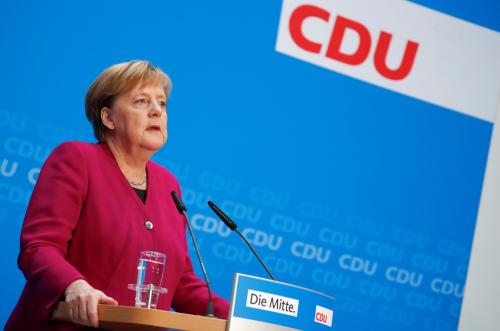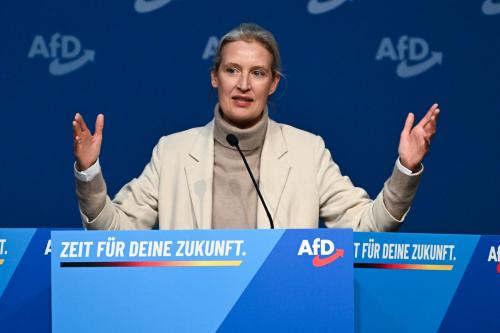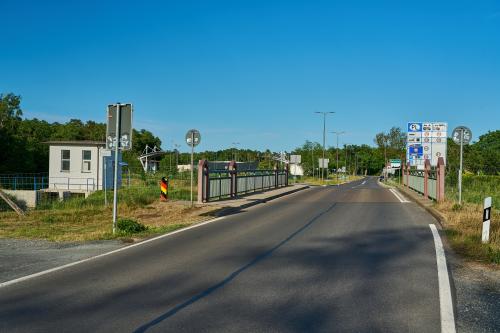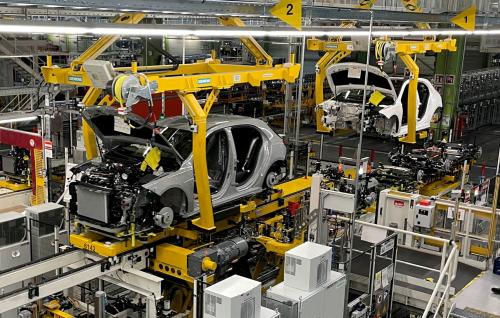Visions of German chancellor Angela Merkel as the only person standing between humanity and the apocalypse became fashionable after U.S. President Donald Trump’s election. But they were always overblown, argues James Kirchick. This piece originally appeared in Politico Europe.
Angela Merkel’s decision to retire from politics has set off alarm bells across the West. Who will hold together what’s left of the liberal world order, once the “leader of the free world” is no longer sitting in the Bundestag?
Visions of the German chancellor as the only person standing between humanity and the apocalypse became fashionable after U.S. President Donald Trump’s election to the White House. But they were always overblown. Merkel herself knows that Germany—with its poorly-equipped military, deeply ingrained pacifism and historical hang-ups—is in no position to defend the West.
There’s no question Europe and the world will survive her departure. Merkel, for all her rock solid stability, is ultimately replaceable. But her exit does add another element of uncertainty to an already highly unpredictable geopolitical state of affairs.
Europe is in a more precarious position now than it has been since the end of the Cold War. With only five months until the Brexit deadline, the United Kingdom and European Union are far from reaching agreement on what that departure—never mind their future relationship—will look like.
Hungary and Poland show no sign of reversing their descents into illiberalism, nor has Russia let up in its campaign to destabilize and divide the EU. Anti-establishment populists rule Italy and are gaining strength in practically every European country. Across the Atlantic, the American president remains an erratic and unpredictable actor.
In his memoir, Ben Rhodes, who served as an adviser to former President Barack Obama, recalled his boss’ last meeting with Merkel before he left office. She told him that she had decided to run for a fourth term “because of Brexit and Trump.”
“She’s all alone,” Obama observed.
To be sure, in her more than a decade in power, Merkel has steered Europe through countless crises, projecting an image of solidity and steadiness on the global stage. In her own country too, she was a voice of reason and a steady pair of hands, the embodiment of “the middle.” Her relentless pro-Europeanism was a counterbalance to the rise of increasingly ambitious and aggressive Euroskeptics.
But now Germany, too, has become more politically unstable, with the rise of the far right populist Alternative for Deutschland and support for the two establishment parties of the post-war order—Merkel’s Christian Democratic Union and the Social Democrats—collapsing.
Last weekend’s state election in Hesse—where Merkel’s party took a serious drubbing at the polls—was the latest in a series of disappointments for the German chancellor. Two weeks earlier, her Bavarian allies in the Christian Social Union suffered one of the worst results in their history. Before that, in a clear sign of disenchantment with a chancellor now into her 13th year in office, CDU backbenchers voted for an obscure challenger over Merkel’s handpicked parliamentary party leader.
Reading the proverbial beer dregs, Merkel finally provided an answer to the question that has dogged her since last year’s Bundestag election, when the CDU suffered a record loss at the polls: She announced her intention not to run for reelection as head of her party in December. While she said she intends to stay in the chancellery until her current term expires in 2021. Now as an officially declared lame duck, there is no guarantee she will last that long.
Merkel, in part, brought this predicament upon herself by allowing over 1 million migrants to enter Germany in 2015, a decision that propelled the AfD, an obscure party initially composed of anti-euro economists, into a right-wing nationalist force that has won seats in every state parliament and became the official opposition in the Bundestag.
But Merkel is also the victim of larger social forces sweeping the West, which have led to the collapse of the political center she bloodlessly embodied. Given Germany’s history and taboos, the sort of mass, nationalist political movements present in most other Western countries had eluded it since the end of World War II. That special dispensation, regretfully, is now over. In this sense, Germany is becoming more “normal.”
Two years into the presidency of Donald Trump, it’s become clear that it takes more than a bad temper, an antipathy toward alliances and a hyperactive Twitter account to overturn the global network of military alliances, trading regimes and diplomatic relationships painstakingly constructed over the past 70 years.
But just as Trump cannot singlehandedly destroy the liberal world order, so it is beyond the powers of a single German chancellor to save it.
The Brookings Institution is committed to quality, independence, and impact.
We are supported by a diverse array of funders. In line with our values and policies, each Brookings publication represents the sole views of its author(s).






Commentary
Why the West will survive Merkel’s departure
October 30, 2018